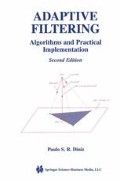Abstract
Least-squares algorithms aim at the minimization of the sum of the squares of the difference between the desired signal and the model filter output [1]–[2]. When new samples of the incoming signals are received at every iteration, the solution for the least-squares problem can be computed in recursive form resulting in the recursive least-squares (RLS) algorithms. The conventional version of these algorithms will be the topic of the present chapter.
Access this chapter
Tax calculation will be finalised at checkout
Purchases are for personal use only
Preview
Unable to display preview. Download preview PDF.
References
G. C. Goodwin and R. L. Payne, Dynamic System Identification: Experiment Design and Data Analysis, Academic Press, New York, NY, 1977.
S. Haykin, Adaptive Filter Theory, Prentice Hall, Englewood Cliffs, NJ, 4th edition, 2002.
S. H. Ardalan, “Floating-point analysis of recursive least-squares and leastmean squares adaptive filters,” IEEE Trans, on Circuits and Systems, vol. CAS-33, pp. 1192–1208, Dec. 1986.
J. M. Ciofß, “Limited precision effects in adaptive filtering,” IEEE Trans, on Circuits and Systems, vol. CAS-34, pp. 821–833, July 1987.
R. S. Medaugh and L. J. Griffiths, “A comparison of two linear predictors,” Proc. IEEE Intern. Conf. on Acoust., Speech, Signal Processing, Atlanta, GA, pp. 293–296, April 1981.
F. Ling and J. G. Proakis, “Nonstationary learning characteristics of least squares adaptive estimation algorithms,” Proc. IEEE Intern. Conf. on Acoust., Speech, Signal Processing, San Diego, CA, pp. 30.3.1.–30.3.4, March 1984.
E. Eleftheriou and D. D. Falconer, “Tracking properties and steady-state performance of RLS adaptive filter algorithms,” IEEE Trans, on Acoust., Speech, and Signal Processing, vol. ASSP-34, pp. 1097–1110, Oct. 1986.
J. M. Cioffi and T. Kailath, “Fast recursive-least-squares transversal filters for adaptive filtering,” IEEE Trans, on Acoust., Speech, and Signal Processing, vol. ASSP-32, pp. 304–337, April 1984.
S. Ardalan, “On the sensitivity of transversal RLS algorithms to random perturbations in the filter coefficients,” IEEE Trans, on Acoust., Speech, and Signal Processing, vol. 36, pp. 1781–1783, Nov. 1988.
C. R. Johnson, Jr., Lectures on Adaptive Parameter Estimation, Prentice Hall, Englewood Cliffs, NJ, 1988.
O. M. Macchi and N. J. Bershad, “Adaptive recovery of a chirped sinusoid in noise, Part 1: performance of the RLS algorithm,” IEEE Trans, on Signal Processing, vol. 39, pp. 583–594, March 1991.
Author information
Authors and Affiliations
Rights and permissions
Copyright information
© 2002 Springer Science+Business Media New York
About this chapter
Cite this chapter
Ramirez, P.S. (2002). Conventional RLS Adaptive Filter. In: Adaptive Filtering. The Kluwer International Series in Engineering and Computer Science, vol 694. Springer, Boston, MA. https://doi.org/10.1007/978-1-4757-3637-3_5
Download citation
DOI: https://doi.org/10.1007/978-1-4757-3637-3_5
Publisher Name: Springer, Boston, MA
Print ISBN: 978-1-4757-3639-7
Online ISBN: 978-1-4757-3637-3
eBook Packages: Springer Book Archive

